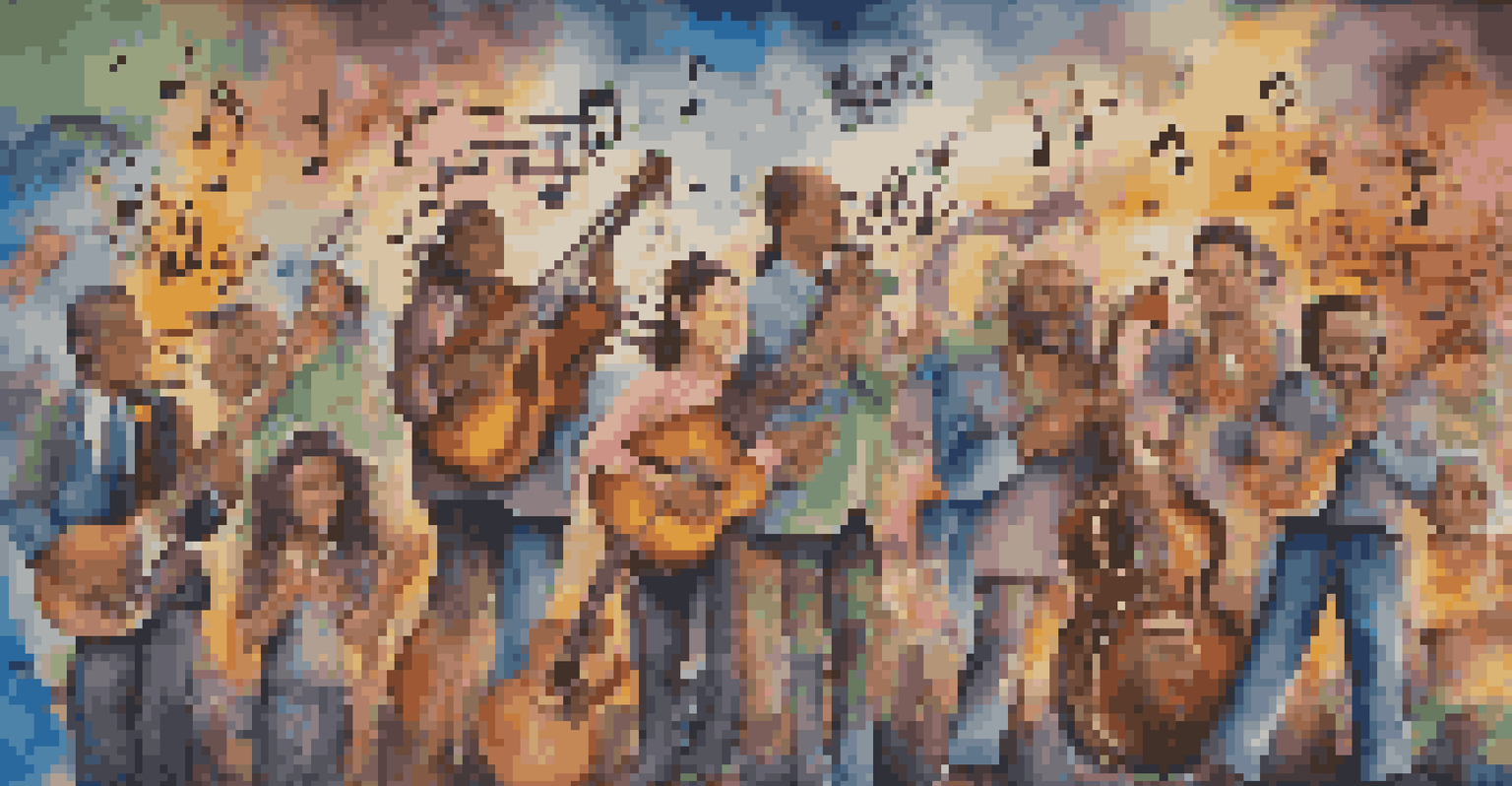The Historical Significance of Music in Political Movements

Introduction: The Power of Music in Politics
Music has been an essential part of human expression, and its role in political movements is profound. From the anthems of revolutions to protest songs, music has the ability to inspire, unify, and mobilize people. It acts as a powerful tool that transcends language barriers and speaks directly to the emotions of individuals, stirring them to action.
Music can change the world because it can change people.
Throughout history, we can see examples of how music has influenced political landscapes. Songs can encapsulate the spirit of a movement, offering a rallying cry that resonates deeply with supporters. This emotional connection can often spur individuals to join causes they might not have otherwise engaged with.
In this article, we will delve into the historical significance of music in various political movements, examining how it has shaped ideologies and fostered change. By understanding this relationship, we can appreciate the profound impact music continues to have on society today.
The Role of Folk Music in Early Political Movements
Folk music has played a crucial role in political movements, especially during times of social change. In the early 20th century, folk songs became anthems for labor rights and civil rights movements, giving voice to the struggles of everyday people. Artists like Woody Guthrie used their music to highlight social injustices and promote the idea of unity among the working class.

These songs often told stories of hardship and hope, creating a sense of community among listeners. They served as a form of oral history, preserving the narratives of those involved in the movements. This connection through storytelling helped to galvanize support and foster a collective identity among activists.
Furthermore, folk music was accessible to the masses, allowing it to spread quickly and widely. As people gathered to sing and share these songs, they strengthened their resolve and commitment to the cause, demonstrating how music can be a unifying force in political activism.
Anthems of Change: The Civil Rights Movement
The Civil Rights Movement in the United States is perhaps one of the most significant examples of music’s role in political change. Songs like 'We Shall Overcome' became anthems for the movement, symbolizing the struggle for equality and justice. This song, rooted in African American spiritual traditions, evolved into a powerful tool for activists, inspiring hope and resilience.
The power of music makes all the difference in the world.
Music not only provided an emotional outlet but also served to unify diverse groups under a common banner. As people sang together during marches and protests, they forged strong connections that transcended individual differences. This collective experience helped to strengthen the movement's resolve and commitment to nonviolent resistance.
Moreover, artists like Nina Simone and Sam Cooke used their platforms to address social issues directly in their music, bringing awareness to the struggles faced by African Americans. Their songs became rallying cries, proving that music can be a catalyst for change and a powerful form of political expression.
Protest Music in the 1960s: A Cultural Revolution
The 1960s were a pivotal time for music and politics, as artists began to embrace protest music as a means of social commentary. The Vietnam War sparked widespread dissent, and musicians like Bob Dylan and Joan Baez used their lyrics to challenge government policies and advocate for peace. Their music resonated with a generation disillusioned by war and eager for change.
Songs like 'Blowin' in the Wind' and 'The Times They Are A-Changin'' became synonymous with the counterculture movement, encapsulating the desire for social justice and equality. These anthems encouraged listeners to question authority and seek out their own truths, fostering a spirit of rebellion and activism.
Additionally, music festivals like Woodstock became significant cultural events, providing a space for like-minded individuals to gather and share their ideals. The sense of community fostered through music during this era contributed to a larger cultural revolution, illustrating how music can serve as both a reflection and a driving force for change.
Global Movements: Music as a Universal Language
Music's influence is not confined to any one country or culture; it has played a vital role in global political movements as well. For instance, the anti-apartheid movement in South Africa saw the emergence of songs like 'Nkosi Sikelel' iAfrika,' which became an emblem of resistance and unity among those fighting for freedom. This song transcended language barriers, uniting diverse groups in their struggle against oppression.
Similarly, Latin American movements have embraced music as a means of protest and expression. The Nueva Canción movement, which blended traditional folk music with political messages, became a powerful tool in the fight against dictatorship and social inequality. Artists like Victor Jara and Mercedes Sosa used their music to inspire hope and resilience among their audiences.
These examples illustrate that music can transcend borders and serve as a universal language of resistance. It has the power to connect individuals across cultures, creating solidarity among those fighting for common causes, reinforcing the idea that music can be a catalyst for global change.
Modern Political Movements: The Digital Age of Music
In today’s digital age, the role of music in political movements has evolved, thanks to the accessibility of technology and social media. Artists can now share their messages instantly with a global audience, allowing their music to inspire and mobilize supporters like never before. Songs addressing contemporary issues, from climate change to social justice, can go viral, reaching millions in a matter of hours.
For example, the song 'This Is America' by Childish Gambino sparked widespread discussions about gun violence and systemic racism in the United States. Its powerful visuals and poignant lyrics resonated with audiences, generating conversations around pressing social issues and mobilizing calls for change.
Moreover, platforms like Spotify and YouTube enable grassroots movements to gain traction, as emerging artists can contribute to the soundtrack of activism. This democratization of music allows for a diverse range of voices to be heard, highlighting the importance of artistic expression in modern political landscapes.
Conclusion: The Enduring Legacy of Music in Politics
As we reflect on the historical significance of music in political movements, it becomes clear that its impact is both profound and enduring. From folk songs of the labor movement to the protest anthems of today, music has consistently played a vital role in shaping collective action and fostering social change. Its ability to inspire and unite people across divides is a testament to its power as a form of expression.
The legacy of music in politics serves as a reminder of the importance of artistic voices in advocating for justice and equality. As new generations rise to address the challenges of our time, music will undoubtedly continue to be a driving force in their movements, providing a platform for solidarity and expression.

Ultimately, the relationship between music and politics is an ongoing narrative, one that will evolve as society changes. By understanding this connection, we can appreciate the ways in which music not only reflects our values but also has the potential to shape our future.